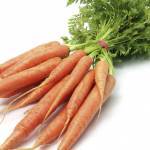A Pinch of Ginger: Use of the Nutraceutical in Horses

Recipes featuring ginger land in Facebook feeds at an alarming rate this time of year—bread, cakes, cookies! No potluck or party is without gingerbread men, sometimes even an entire gingerbread house, it seems. While most horses might enjoy the occasional ginger-flavored treat, others use the herb routinely, even daily. Will ginger harm horses, either in the occasional morsel or the everyday slug?
“I’ve seen horse owners feed gingersnap cookies, and horses really seem to enjoy them,” said lifelong horse owner and Kentucky Equine Research (KER) nutritionist Kathleen Crandell, Ph.D. “Horses are fairly predictable in their response to cookies: once they’ve acquired a taste for sweet treats, they never seem to lose it. The occasional ginger-laced cookie is not a problem whatsoever.”
From a scientific perspective, the effect of ginger (Zingiber officinale) on horses has been merely superficially studied to date.
A study* conducted at Rutgers University measured the effect of a single dose of ginger extract on anti-inflammatory and cardiovascular indices following exercise. Horses were given ginger extract one hour prior to an exercise bout and were then worked to the point of fatigue. Favorably, researchers noted reduced recovery time of ginger-supplemented horses. On the flip side, ginger triggered an upswing in pro-inflammatory proteins and the enzyme creatine kinase. Further, the caustic nature of the ginger solution was thought to have inflamed gastrointestinal tissue, and this would have intensified with the associated rise in creatine kinase.
Another study**, also completed at Rutgers, tested the oxidative stress and antioxidant status of intensely worked Standardbred mares administered ginger extract. A single dose of ginger extract did not produce an effect on the measured indices.
In humans, ginger is a proven ulcerogenic, or ulcer-causing agent, and the same is thought to be true in horses. Medical research in humans found that ginger decreased mucus secretion in the stomach, due to the inhibition of prostaglandin synthesis, and limited buffering capacity, which ultimately led to gastric ulcers. Despite this, some equine herbal supplements intended to soothe discomfort associated with gastric ulcers contain ginger as a principle ingredient.
Gingerbread for horses? “In Spain, it’s common for horse owners to feed their horses day-old bread, so I can’t imagine a piece of gingerbread will cause a problem,” explained Crandell. “Moderation is key—one small slice, acceptable; an entire gingerbread house, unacceptable. Owners should enjoy their horses, and pampering them with treats is part of that for some owners, but drastic dietary changes can cause problems for horses, especially ones that have proven sensitive in the past.”
Final word: Go ahead, give Old Dobbin the slice of gingerbread or a couple of gingersnap cookies. Keep in mind, though, the research community has not done sufficient research on daily ginger supplementation to yea or nay its day-to-day use.
*Liburt, N.R. 2005. Effects of ginger and cranberry extracts on markers of inflammation and performance following intense exercise in horses. Master’s Thesis. Rutgers, the State University of New Jersey.
**Smarsh, D.N., N. Liburt, J. Streltsova, K. McKeever, and C.A. Williams. 2010. Oxidative stress and antioxidant status in intensely exercising horses administered nutraceutical extracts. Equine Veterinary Journal Supplement. Vol. 38:317-322.








